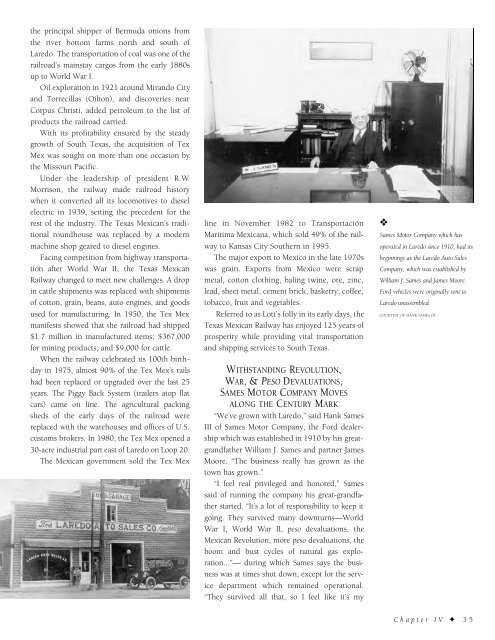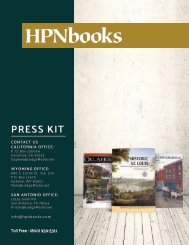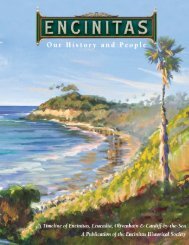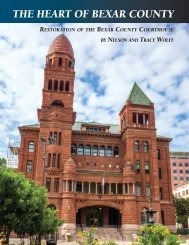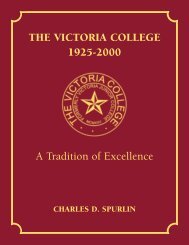Historic Laredo
An illustrated history of the city of Laredo and the Webb County area, paired with the histories of companies, families and organizations that make the region great.
An illustrated history of the city of Laredo and the Webb County area, paired with the histories of companies, families and organizations that make the region great.
You also want an ePaper? Increase the reach of your titles
YUMPU automatically turns print PDFs into web optimized ePapers that Google loves.
the principal shipper of Bermuda onions from<br />
the river bottom farms north and south of<br />
<strong>Laredo</strong>. The transportation of coal was one of the<br />
railroad’s mainstay cargos from the early 1880s<br />
up to World War I.<br />
Oil exploration in 1921 around Mirando City<br />
and Torrecillas (Oilton), and discoveries near<br />
Corpus Christi, added petroleum to the list of<br />
products the railroad carried.<br />
With its profitability ensured by the steady<br />
growth of South Texas, the acquisition of Tex<br />
Mex was sought on more than one occasion by<br />
the Missouri Pacific.<br />
Under the leadership of president R.W.<br />
Morrison, the railway made railroad history<br />
when it converted all its locomotives to diesel<br />
electric in 1939, setting the precedent for the<br />
rest of the industry. The Texas Mexican’s traditional<br />
roundhouse was replaced by a modern<br />
machine shop geared to diesel engines.<br />
Facing competition from highway transportation<br />
after World War II, the Texas Mexican<br />
Railway changed to meet new challenges. A drop<br />
in cattle shipments was replaced with shipments<br />
of cotton, grain, beans, auto engines, and goods<br />
used for manufacturing. In 1950, the Tex Mex<br />
manifests showed that the railroad had shipped<br />
$1.7 million in manufactured items; $367,000<br />
for mining products; and $9,000 for cattle.<br />
When the railway celebrated its 100th birthday<br />
in 1975, almost 90% of the Tex Mex’s rails<br />
had been replaced or upgraded over the last 25<br />
years. The Piggy Back System (trailers atop flat<br />
cars) came on line. The agricultural packing<br />
sheds of the early days of the railroad were<br />
replaced with the warehouses and offices of U.S.<br />
customs brokers. In 1980, the Tex Mex opened a<br />
30-acre industrial part east of <strong>Laredo</strong> on Loop 20.<br />
The Mexican government sold the Tex Mex<br />
line in November 1982 to Transportación<br />
Marítima Mexicana, which sold 49% of the railway<br />
to Kansas City Southern in 1995.<br />
The major export to Mexico in the late 1970s<br />
was grain. Exports from Mexico were scrap<br />
metal, cotton clothing, baling twine, ore, zinc,<br />
lead, sheet metal, cement brick, basketry, coffee,<br />
tobacco, fruit and vegetables.<br />
Referred to as Lott’s folly in its early days, the<br />
Texas Mexican Railway has enjoyed 125 years of<br />
prosperity while providing vital transportation<br />
and shipping services to South Texas.<br />
WITHSTANDING REVOLUTION,<br />
WAR, & PESO DEVALUATIONS,<br />
SAMES MOTOR COMPANY MOVES<br />
ALONG THE CENTURY MARK<br />
“We’ve grown with <strong>Laredo</strong>,” said Hank Sames<br />
III of Sames Motor Company, the Ford dealership<br />
which was established in 1910 by his greatgrandfather<br />
William J. Sames and partner James<br />
Moore. “The business really has grown as the<br />
town has grown.”<br />
“I feel real privileged and honored,” Sames<br />
said of running the company his great-grandfather<br />
started. “It’s a lot of responsibility to keep it<br />
going. They survived many downturns—World<br />
War I, World War II, peso devaluations, the<br />
Mexican Revolution, more peso devaluations, the<br />
boom and bust cycles of natural gas exploration...”—<br />
during which Sames says the business<br />
was at times shut down, except for the service<br />
department which remained operational.<br />
“They survived all that, so I feel like it’s my<br />
❖<br />
Sames Motor Company which has<br />
operated in <strong>Laredo</strong> since 1910, had its<br />
beginnings as the <strong>Laredo</strong> Auto Sales<br />
Company, which was established by<br />
William J. Sames and James Moore.<br />
Ford vehicles were originally sent to<br />
<strong>Laredo</strong> unassembled.<br />
COURTESY OF HANK SAMES III<br />
Chapter IV ✦ 35


